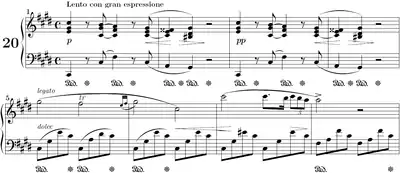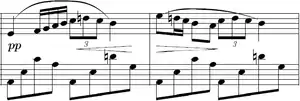Nocturne in C-sharp minor, Op. posth. (Chopin)
The Nocturne No. 20 in C♯ minor, Op. posth., Lento con gran espressione, P 1, No. 16, KKIVa/16, is a solo piano piece composed by Frédéric Chopin in 1830 and published in 1870.

Chopin dedicated this work to his older sister Ludwika Chopin, with the statement: "To my sister Ludwika as an exercise before beginning the study of my second Concerto".[1][2] First published 21 years after the composer's death, the piece is usually referred to as Lento con gran espressione, from its tempo marking. It is sometimes also called Reminiscence.[3] The piece was played by Holocaust survivor Natalia Karp for the Nazi concentration camp commandant Amon Goeth, with Goeth being so impressed with the rendition that he spared Karp's life.[4]
This was also the piece played by Holocaust survivor and famed Polish pianist Władysław Szpilman (the central figure of the 2002 Roman Polanski film The Pianist) during the last live broadcast of Polish radio on September 23, 1939 when Warsaw was besieged by the German army.[5] Years later Szpilman also played this piece for German army officer Wilm Hosenfeld upon their first meeting,[6] though in the corresponding film scene Szpilman plays an abridged version of Chopin's Ballade No. 1 in G minor, Op. 23. Hosenfeld later helped Szpilman hide and provided food to him in the last months of the war.
Musical structure

The piece is marked Lento con gran espressione and is written in common time. After a soft, sad introduction, the main theme starts at bar 5, with the left hand playing broken chords in legato slurs throughout the section, imparting a haunting and continuous quality to the music (similar to the Moonlight Sonata). The theme then shifts to a dreamy pianissimo in bar 21, before returning to the original theme in bar 47, and finally ending in C♯ major. The first two bars of the theme from the middle section (bars 21 and 22), resemble the main theme from the third movement of Chopin's second piano concerto in F minor, which was composed around the same time (1829). The next two bars (bars 23 and 24) resemble the second part of the secondary theme of the first movement from his second piano concerto. The passage in the middle section of the nocturne in 3/4 time starting in bar 33 resembles the scherzando section of the third movement of the second piano concerto starting in bar 145 in which the left and right hand are playing an octave apart. In bars 58-61, there are 4 different tuplets; an 18-tuplet, a 35-tuplet, an 11-tuplet, and a 13-tuplet, all of which run through the E Major scale. The piece ends in pianississimo with a high and low C#.

In popular culture
- The Nocturne is featured in the Roman Polanski film The Pianist. It is played twice (both times incompletely) in the film, at the beginning and at the end, by the protagonist Władysław Szpilman, at the recording studio at Warsaw Radio. The complete piece is provided in the soundtrack, played by Polish classical pianist Janusz Olejniczak.
- It is also featured in Terminator: The Sarah Connor Chronicles, in episode 7 of season 1. Towards the end of the episode, Cameron dances ballet to the piece.
- This piece is played briefly in episode 1 of season 1 of Foyle's War by David Horovitch's character Thomas Kramer near the beginning of the episode.
- Classically trained R&B/Soul singer Alicia Keys samples the piece in "As I Am (Intro)" from her 2007 album As I Am.
- A version played by violin is featured in the 2010 film The Karate Kid starring Jackie Chan and Jaden Smith.
- It is featured in the 1997 action thriller The Peacemaker (with George Clooney and Nicole Kidman) at 1:02:42.
- Nneka Lucia Egbuna, a Nigerian-German hip hop/soul singer, uses a sample from this piece of work in her song "My Home".
- It is featured in The Killing at the beginning of episode 4 of season 4.
- It was featured in the horror movie The Innkeepers, played by a ghost in one of the movies dramatic scenes.
- It is played during a Quarantine Zone in the video game Dying Light.
- It is featured in the 2015 documentary Going Clear, played in theremin and harpsichord duet by thereminist Dorit Chrysler and pianist Phaedon Papadopoulos.[7]
- It is heard from Mafia III, where Lincoln Clay visits the country club, owned by Sal Marcano.
- Russian Figure Skater Evgenia Medvedeva set a new short program world record skating to this piece at the 2018 Pyeongchang Winter Olympics. [8]
- It is featured in the 2016 film Frantz. Fragments of it are played in multiple scenes, first a duo for violin and piano by protagonists Adrien and Anna, later by Frantz on solo violin. [9]
- The Nocturne is also featured in Vera (TV series), Season One, Episode 2: Telling Tales. [10]
References
- Narodowy Instytut Fryderyka Chopina
- Murdoch, William (1935). Chopin: His Life.
- http://en.chopin.nifc.pl/chopin/manuscripts/detail/id/250
- Charters, David. "Natalia Karp". Liverpool Daily Post. Retrieved 2008-04-02.
- "Music tells Holocaust survivor's harrowing tale". The Press. Retrieved 2019-01-31.
- Tiedemann, Garrett (April 6, 2015). "Interview: 'Going Clear' composer Will Bates". YourClassical. Retrieved March 12, 2019.
- http://www.isuresults.com/isujsstat/o100lto.htm
- https://www.imdb.com/title/tt5029608/soundtrack
- IMDb, Vera, 2011. Season 1: Episode 2. Telling Tales. https://www.imdb.com/title/tt1763140/>